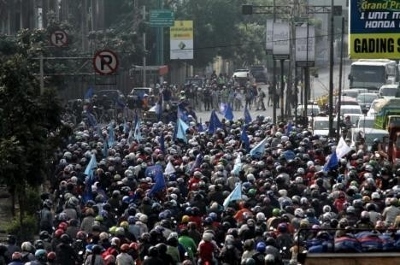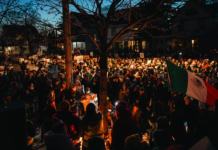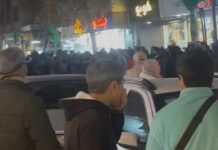Neither old elites nor populists have answer for workers and poor
Iyan, CWI Malaysia
Indonesia had legislative elections on April 9th. Final results on May 9th showed that the Indonesian Democratic Party of Struggle (PDIP), which is lead by Megawati (former President of Indonesia in 2001 to 2004), received 19% of the votes. Golkar, the party that ruled for 32 years (1966-1998) under the reign of dictator, Suharto, came second with 15%. In third place was the Gerindra Party (with 12%). This party is led by Prabowo, a former army General who faced allegations of involvement in grave human rights abuses under the Suharto dictatorship in 1998.
Although the share of the votes for each party in the general election is now clear, the electoral procedures are still not over. On July 9th the election will take place for the next president of Indonesia to replace Susilo Bambang Yudhoyono. Parties wanting to make a nomination must have won at least 25 % of the votes in the legislative election so the only way this time is through forming a coalition. The political elites of the different parties have been busy at the negotiating table.
If in the presidential election there is no candidate receiving over 50%, the two candidates with the most votes will face each other in a second round to be held in September. This is very likely.
Democracy struggle
Indonesia, had a significant influence of Left ideas in the past as a result of the fight for independence from colonialism. But Suharto maintained his dictatorship for 32 years after the slaughter in 1965-66 of hundreds of thousands of members of the Indonesian Communist Party and alleged sympathisers, as well as many ethnic Chinese.
There has been a series of neo-liberal and free market governments since the overthrow of Suharto. People have become increasingly dissatisfied with the endemic corruption in government, the lack of infrastructure, rampant increases in the price of staple food items, poor health services, low living standards and uncertain economic prospects. The government of Susilo Bambang Yudhoyono now has the lowest approval rating since he came into power in 2004.
People hope a newly elected government can liberate them from the 15 years of a new kind of authoritarian rule since the fall of Suharto and get out of the ongoing social and economic problems. Some are disillusioned with elections and political parties which do not solve the people’s day-to-day issues. This is why the turnout this time, at 73 %, is lower than previous elections.
In the 1999 election held after the fall of the Suharto autocratic regime, the turnout of 93% shows the huge hope for change that people had in a ‘democratic’ government. But, in the following general election, the turnout declined. In the last three general elections, the number of votes gained by the winning party was lower than the number of ‘golput’ – the people that protest by not voting.
The real winner of the last three general elections has been the ‘golput’. Many of them have become disappointed by elections that do not bring real change in society and they see mainstream politics as a ‘political safari – the capitalists’ political playground attacking the common people’s needs. But abstaining is not enough to change the social and economic problems of the majority. The strength of feeling needs to be channelled into building a political alternative to capitalist parties.
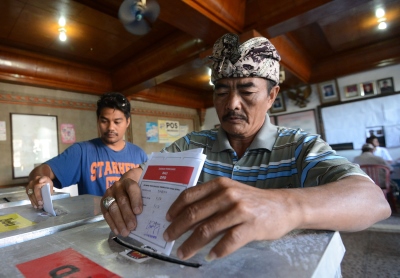
Failure of left party
After the fall of Suharto there were some reforms in democratic rights, including the right to form trade unions and political parties There was a feeling among the working class and poor for the idea of creating their own political voice. National general strikes in 2012 and 2013 show the huge economic power of the working class that could challenge capitalism. But so far this strength has not been channelled into building a political alternative for the working class. Instead of doing this, some trade union leaders and left activists are supporting a candidate or a party that follows a capitalist agenda as representing a ‘progressive bourgeoisie’ or ‘lesser evil’.
The People’s Democratic Party (PRD) played a significant role in the overthrow of Suharto and was once the reference point of young radical left activists and to a certain extent the working class. But it has never overcome the splits and ideological crisis that developed inside the party from 1999. Their popularity as a radical party that was admired by progressive young people became meaningless as they were not able to respond to the political developments that emerged after the ‘reformasi’ movement overthrew Suharto. They had the opportunity to develop a revolutionary approach with socialist policies and looking to the working class, but they allowed the political elite around Megawati to make the running.
Fatal political errors affected the development of the PRD and the left movement in Indonesia. Just a year after the departure of Suharto, as the first general election was held, the PRD contested the election without getting a single legislative seat and merely 0.07% popular support. Failure to win any seats caused internal discord and the party has so far not recovered. Many PRD activists gave up radical politics and chose to get involved with bourgeois parties. Even some became the spokespersons of the government, acting against the interests of the working class.
Since the 1999 general election there has never again been a radical left contesting in a general election. In the past, lefts chose to join the PDIP as the ‘party of the progressive bourgeoisie’, but now their choice is based on how popular a party is and how likely it is to ease their way into parliament, regardless of whether the party is progressive or not.
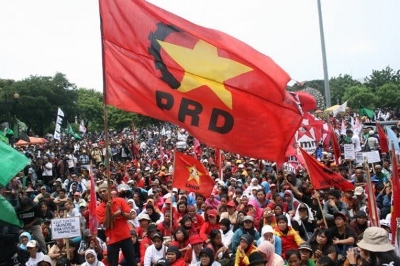
Return of old political elites
With the political vacuum that has existed on the left and for the working class and poor people, the legislative elections show a strengthening of the old political elites. Apart from Jokowi of the PDIP, almost all the party leaders and the candidates who will contest the presidential elections are the political elite and once were part of Suharto’s regime. For the first time one of Suharto’s children won a seat for Golkar, after a 16-year family absence from politics. Their propaganda during the election campaign was: “What’s up? Life was better in my father’s time, right?”.
Some people do feel their life was better under the Suharto regime even though there was no democracy, and are disillusioned that living standards have worsened. A World Bank report in March showed that income inequality as measured by the Gini coefficient widened to 0.41 in 2012 from 0.35 in 2005 – past the 0.4 level that the United Nations has said is a precursor of social unrest.
The CWI emphasised during the ‘reformasi’ period in 1998 that the struggle merely for democracy or reforms is not enough but should be accompanied by socialist demands that address the social and economic needs of the working class and poor for genuine change. The social and economic frustrations among people are today used by Golkar to regain support. They have put forward the tycoon Aburizal Bakrie, a former economy minister and head of the family that owns the massive Bakrie Group, as their presidential candidate.
The most prominent figure from the old political elite is Prabowo, Suharto’s former son-in-law, who was responsible for the abduction of activists (including prominent members of the PRD) in 1998. After being fired from the military, he founded his own party, Gerindra and has contested general elections since 2004. Prabowo is hated by some left activists and pro-democracy groups because of his military background and past human rights abuses. But he is now supported by some left-wing activists; some are even former activists who were victims of abduction.
Prabowo promises to build a ‘people’s economy’ and to increase investment 10-fold in agriculture, which 70 per cent of Indonesians still depend on for a living. But with Indonesia’s ‘fragile economy’ and slowing growth rate, this ‘people’s economy’ cannot be achieved under the rule of capitalism and landlordism.
Prabowo is also getting support from Said Iqbal, the president of the FSPMI (Federation of Indonesian Metal Workers Unions) and the KSPI (Confederation of Indonesian Workers’ Unions), which are two of the largest trade unions in Indonesia. Both of these unions played a leading role in the national strikes involving more than 2 million workers in 2012 and 2013. Unfortunately the leaders of these unions have turned a blind eye to Prabowo’s inherently anti-democratic and anti-worker standpoint. In response to the human rights violations committed by Prabowo, Iqbal said: “Prabowo is linked to human rights abuse, but that is not related to the workers’ life.”
The votes gained by each of the five right-wing Islamic parties in Indonesia ranged from 1% to 9%, but the total votes for all those Islamic parties of around 31% is still significant. With Islamic political rhetoric in the biggest Muslim country in the world, they could grow in support in the coming years by using the worsening social and economic conditions, especially if the right wing secular parties once again disappoint the masses. The experiences of Islamic parties in Egypt (Muslim Brotherhood) and in Tunisia (Ennahda), have shown when in power that they accept the rule of capitalism and are unable to liberate the people from the social and economic crisis.
Populist politics of Jokowi
As the presidential candidate from the PDIP, the party that the largest number of seats in the legislative election, Joko Widodo (best known as Jokowi) has the best chance to become president. He is the only candidate with any political influence that is not from the old political elite. His star has begun to rise spectacularly on the national level in the past two years. This is linked to his leadership style which is considered simple and down to earth. He has a clean reputation, that differentiates him from the others in the political elite. He looks and sounds like an ‘ordinary Joe’ and has been getting support from both the working and middle classes.
When running for a second term as mayor of the city of Solo, Central Java, he gained more than 90% of the vote. In 2012, the World Mayor Project through its official website recognised Jokowi as the third best mayor in the world! His success in managing the city administration better than other mayors gained a good response from the public all over Indonesia who are fed up with inequality and corruption. The people of Jakarta then urged him to run for governor of Jakarta in 2012, though his tenure as mayor in Solo was not over.
Jokowi became increasingly popular after taking over the Jakarta governor’s post for his down-to-earth approach in dealing with the public directly and addressing their grievances. The PDIP immediately used the popularity of Jokowi to nominate him as the presidential candidate rather than choosing the party leader, Megawati, whose name is tainted by implementing right-wing capitalist policies during her presidential tenure from 2001 to 2004.
The prominent union leader, Said Iqbal, who supports Prabowo, denounced the policy of Jokowi as not being in favour of working class needs. His allegations against Jokowi are correct. Although popular in the eyes of the people, in terms of policies for the business class, Jokowi clearly supports the profit-oriented capitalist system. During the national strike, led by Said Iqbal in 2013 demanding a minimum wage increase, Jokowi opposed their demands. Only under pressure did he ultimately agree to increases in the provinces of Jakarta, but the amount of increase was still far below workers’ demands.
Jokowi is the favourite presidential candidate for the international capitalists and foreign powers, especially the United States. As the Financial Times put it: “Many international investors see Mr Widowo in the same light as the prime ministerial favourite, Narendra Modi in India: a no-nonsense outsider who can shake up the lacklustre establishment and kick-start stalled reforms, including cutting subsidies and red tape”. When the capitalist press talk about kick-starting reforms, they mean accelerating neo-liberal policies and attacks on the working class and public sector.
With Jokowi and his pro-business policies, it is reasonable to expect Said Iqbal as a union leader to refuse support for Jokowi. But his support for Prabowo has shown that he has his own political interests, not based on the interests of the working class who make up his union base. Prabowo has a far worse attitude towards the working class than even Jokowi. Earlier this year, 600 people in one of the companies owned by Prabowo were on strike for unpaid wages for 5 months. In a speech, Prabowo stressed that he will implement neo-liberal policies if he wins the presidency. Prabowo also supports the Anti-Communist Front – an NGO which physically attacks Left activists.
Jokowi has been presented as the only hope for most of the left and human rights activists to prevent a Prabowo presidency. Many of them have become volunteers to campaign for Jokowi. But Jokowi has never clearly stated his attitude towards human rights violators such as Prabowo. If Jokowi – ‘Mr Clean’ – wins the presidency, his administration will inevitably use the same corruption-tinged methods as his predecessors. This is the logic of capitalism.
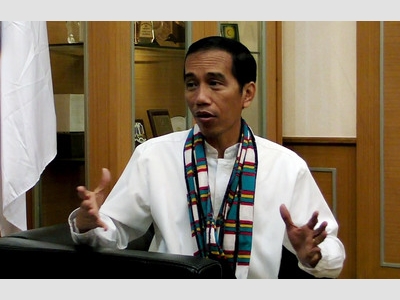
Indonesia needs a mass workers’ party and socialism!
Indonesia’s experience once again shows that in bourgeois elections and politics, people are asked to choose the best candidate from among the worst. This happens because there is no political party that has actually been started from below to represent the needs of the working class and rural poor.
The growth and strength of the labour movement has been impressive lately with the general strikes. But what it lacks is the perspective of developing a party that represents workers’ needs. Currently none of the many left groups, whether they originate from the splits from the PRD or not, has significant influence among the working class and rural poor. Socialists in Indonesia should learn from the past experiences of the left such as the PKI (Communist Party of Indonesia) and PRD, and correct their mistakes to build a working class and rural poor alternative. This is also the way to win over the ‘golput’ (abstainers) to the side of a new working class party with a socialist alternative to capitalism.
